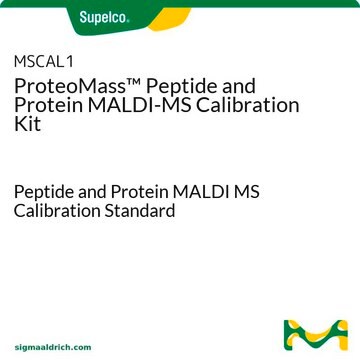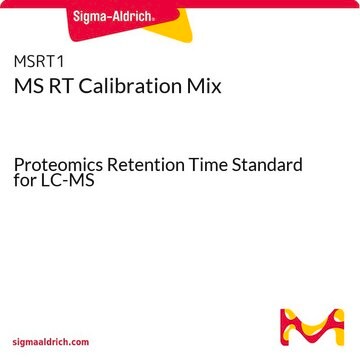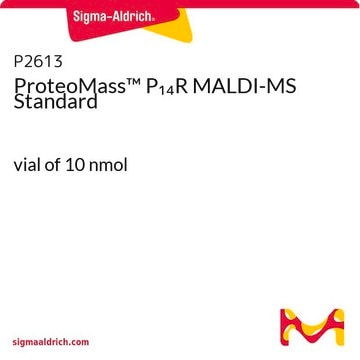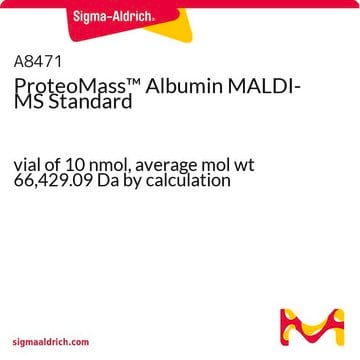MSCAL2
ProteoMass™ Peptide MALDI-MS Calibration Kit
Peptide MALDI MS Calibration Standard
Sinónimos:
Peptide Mass Spectrometry Calibrators
About This Item
Productos recomendados
product line
ProteoMass™
Quality Level
quality
Peptide MALDI MS Calibration Standard
application(s)
cleaning products
cosmetics
flavors and fragrances
food and beverages
personal care
storage temp.
15-25°C
Application
ProteoMass™ Peptide MALDI-MS Calibration Kit has been used as a mass calibration standard for MALDI-TOF MS (matrix assisted laser desorption ionization-time of flight mass spectrometry) analysis.
Legal Information
Los componentes del kit también están disponibles por separado
- B4181ProteoMass™ Bradykinin Fragment 1-7 MALDI-MS Standard, vial of 10 nmol, monoisotopic mol wt 756.3997 Da 2 x 10SDS
- A8846ProteoMass™ Angiotensin II MALDI-MS Standard, vial of 10 nmol 2 x 10SDS
- P2613ProteoMass™ P14R MALDI-MS Standard, vial of 10 nmol 2 x 10SDS
- A8346ProteoMass™ ACTH Fragment 18-39 MALDI-MS Standard, vial of 10 nmol, monoisotopic mol wt 2,464.1989 Da 2 x 10SDS
- I6154ProteoMass™ Insulin chain B oxidized MALDI-MS Standard, vial of 10 nmol 2 x 10SDS
- Acetonitrile 30 mL
- C8982α-Cyano-4-hydroxycinnamic acid, suitable for MALDI-TOF MS 8 x 10SDS
Related product
signalword
Danger
Hazard Classifications
Acute Tox. 4 Dermal - Acute Tox. 4 Inhalation - Acute Tox. 4 Oral - Eye Irrit. 2 - Flam. Liq. 2 - Skin Irrit. 2 - Skin Sens. 1
Storage Class
3 - Flammable liquids
flash_point_f
35.6 °F
flash_point_c
2 °C
Certificados de análisis (COA)
Busque Certificados de análisis (COA) introduciendo el número de lote del producto. Los números de lote se encuentran en la etiqueta del producto después de las palabras «Lot» o «Batch»
¿Ya tiene este producto?
Encuentre la documentación para los productos que ha comprado recientemente en la Biblioteca de documentos.
Los clientes también vieron
Nuestro equipo de científicos tiene experiencia en todas las áreas de investigación: Ciencias de la vida, Ciencia de los materiales, Síntesis química, Cromatografía, Analítica y muchas otras.
Póngase en contacto con el Servicio técnico













